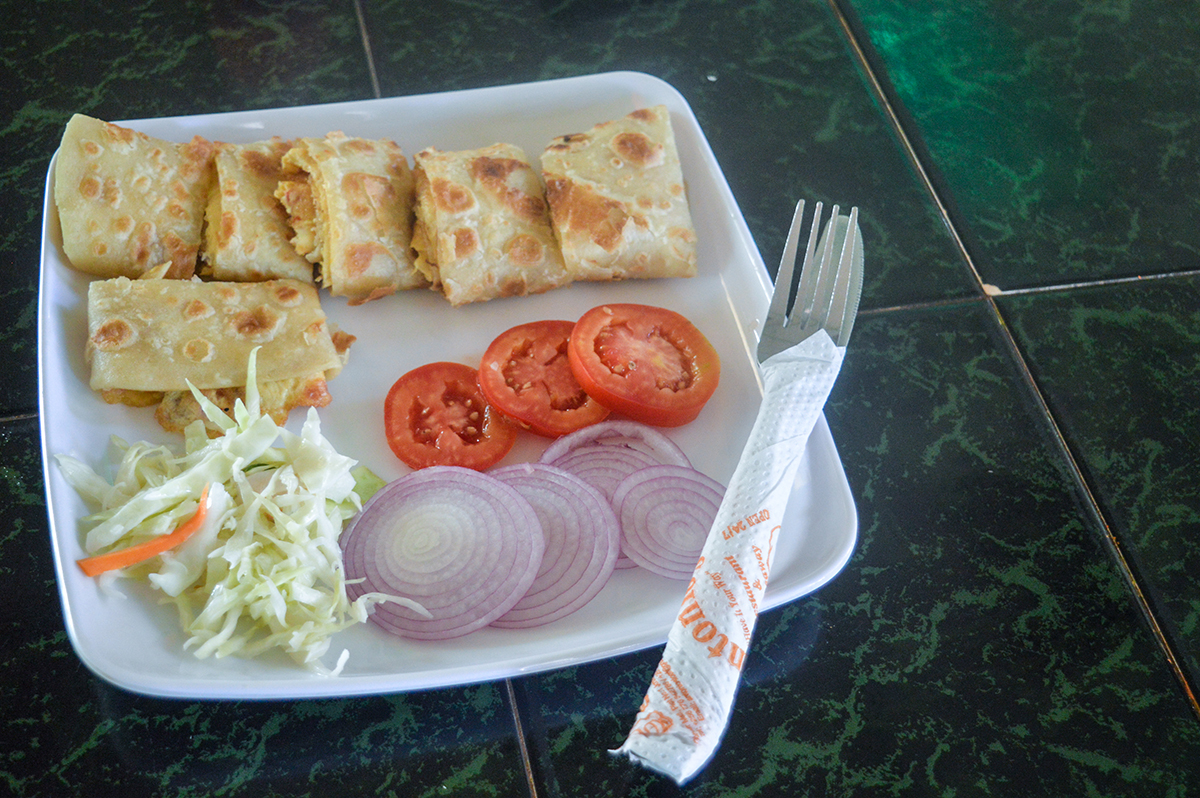
Apophia Agiresaasi, GPJ Uganda
Ismah Ssenyonjo, 19, makes rolex, a chapati sandwich, in Kisaasi, a suburb of Kampala, Uganda. Rolex, made with onions, tomatoes, eggs and cabbage, has become a popular dish in the country. “I make about 100 rolex a day,” says Ssenyonjo.
KAMPALA, UGANDA — Ismah Ssenyonjo 19, stands in a makeshift wooden structure surrounded by balls of dough, onions, tomatoes, eggs, cooking oil and cabbage.
Beside him, a flat pan sits atop hot coals.
He’s making rolex.
Ssenyonjo takes a wooden rolling pin and begins flattening a clump of dough. Then, he spoons a little oil into the pan and places the flattened dough in it to make a chapati, a crispy unleavened flatbread popular throughout the region. He turns the dough until it browns. Then he breaks two eggs into a plastic cup, adds a little salt and fries the eggs in the pan, immediately after removing the chapati.



Once the eggs are ready, he places the chapati on top of the eggs and rolls it up. He cuts tomatoes, onions and cabbage and serves up his first rolex of the day.
“I make about 100 rolex a day,” he says. “The snack is quite popular.”
Rolex sells for 1,000 to 2,000 Ugandan shillings (28 cents to 56 cents), depending on the toppings, he says.
Rolex is a favorite here. Served as a breakfast, lunch, snack or supper, rolex takes less than five minutes to make and can be found on many street corners in Kampala. Once only enjoyed among Uganda’s poor, the snack was promoted by the government tourism agency last year, leading to its rise in popularity.



Made a hit by university students on a budget, rolex got its name from the way the eggs are rolled into the chapati. The name might have also emerged to make the dish sound fancy.
Rolex became a frequent dish among university students and busy people who had no time to cook, especially for the evening meal. It was an easy snack to have for supper. First, the chapati was served with beans; later with eggs and vegetables.
It was launched as a tourism product last year by Godfrey Kiwanda, the state minister for tourism, wildlife and antiquities and member of Parliament for Mityana North.
Racheal Nassolo hands over 1,500 shillings (42 cents) to Ssenyonjo. In return, he gives her a hot rolex.
Nassolo says rolex is delicious and pocket friendly.
“We like the rolex because it is sweet and not expensive,” she says.
Ismah Sigina, a rolex maker at Antonio’s Restaurant and Takeaway, says the dish is fast and cost-effective. It takes between three and five minutes. And one packet (2 kilograms) of flour can make up to 30 chapatis, depending on the size the customer requests. Some patrons want the rolex served with tomatoes, onions and other vegetables mixed with the eggs, but others prefer the vegetables as toppings. A rolex at Antonio’s costs 6,000 to 7,000 shillings ($1.67 to $1.95), says restaurant owner Shah Rais Khan. He says Antonio’s sells at least 50 per day.



The snack has gained popularity among tourists.
“They prefer to taste new things. Especially local delicacies,” he says.
Winnie Kyohairwe, a rolex lover, says she often buys the tasty, nutritious snack from Hamuza Buyinza, 18, who makes and sells rolex daily at a makeshift structure in the Kamwokya area of Kampala.
“Everyone likes eggs, and when you mix it with chapati, it is sweet,” she says.



WHAT YOU NEED
2 large mixing bowls
Rolling pin
Whisk or spoon
Pan
INGREDIENTS
12 cups (1 1/2 kilograms) of wheat flour
2 cups (1/2 a liter) water
Cooking oil
Salt
Sugar
2 Eggs, scrambled
1 tomato, thinly sliced
1/2 an onions thinly sliced
1/2 a cup of cabbage, thinly sliced
Makes chapati dough for 20-23 portions. Vegetable and egg portions serve 2-3 people.
HOW TO MAKE ROLEX
1. Add the flour into a bowl.
2. In another bowl, mix salt, sugar, a little cooking oil and the water together.
3. Pour the wet mixture in the flour and knead the dough for about five minutes. Add small amounts of flour if necessary, to achieve a doughy consistency.
4. Roll portions of the dough into palm-sized balls.
5. Roll the dough balls into a chapati, or flat pancake, and place them in a hot pan on a charcoal stove or stovetop, over a medium-high heat.
6. Rotate the chapati until it is lightly brown and crispy.
7. Break two eggs into a pan, add salt and whisk them until scrambled. Here you have the option to add the tomatoes, onions and cabbage to the egg mixture, or to serve them raw, on top of the chapati at the end.
8. Place the scrambled egg, or egg mixture, on top of the chapati.
9. Roll the chapati in half and enjoy your rolex. There’s enough dough for about 22 more servings, so get to rolling!







